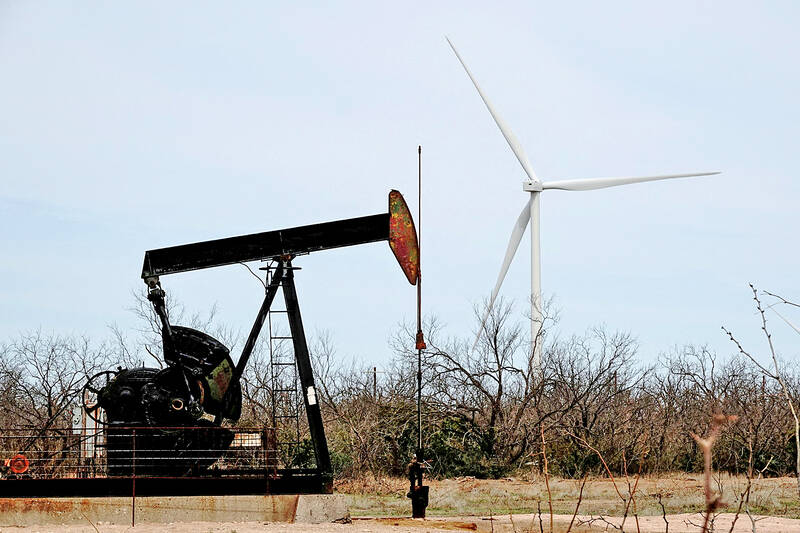Global oil demand in the first half of this year grew at its slowest pace since 2020 due to China’s economic slump, the International Energy Agency (IEA) said yesterday, prompting the agency to lower its full-year forecast.
Demand increased by 800,000 barrels per day (bpd) in the first six months of this year, compared with 2.3 million bpd over the same period last year, the IEA said in its monthly oil market report.
“The chief driver of this downturn is a rapidly slowing China, where consumption contracted y-o-y [year-on-year] for a fourth straight month in July,” the Paris-based agency said.

Photo: Reuters
China is among the world’s top consumers and importers of oil, but the world’s second-biggest economy has struggled amid weak consumer spending, a property sector crisis and high unemployment.
The IEA also cited the country’s shift away from oil in favor of alternative energy.
Rising sales of electric vehicles are reducing demand for road fuel, while the development of its vast high-speed rail network is restricting growth in domestic air travel, the IEA said.
Outside of China, “oil demand is tepid at best,” it added.
For the full year, global oil demand is forecast to grow on average by 900,000 bpd, about 70,000 bpd below the IEA’s previous estimate.
That would take total demand to almost 103 million bpd.
Oil prices have weakened this year over concerns about the global economic outlook.
This week, Brent North Sea crude, the international benchmark, fell below US$70 per barrel for the first time since December 2021.
The fall in prices has prompted leading members of the OPEC+ oil cartel, including Saudi Arabia and Russia, to postpone a planned output increase and instead extend voluntary supply cuts until the end of November.
The IEA said the delay gives OPEC+ “some time to further evaluate demand prospects for next year,” as well as the impact of output disruptions in Libya.
However, with supply from non-OPEC+ nations rising faster than overall demand, the group “may be staring at a substantial surplus, even if its extra curbs were to remain in place,” it said.

When an apartment comes up for rent in Germany’s big cities, hundreds of prospective tenants often queue down the street to view it, but the acute shortage of affordable housing is getting scant attention ahead of today’s snap general election. “Housing is one of the main problems for people, but nobody talks about it, nobody takes it seriously,” said Andreas Ibel, president of Build Europe, an association representing housing developers. Migration and the sluggish economy top the list of voters’ concerns, but analysts say housing policy fails to break through as returns on investment take time to register, making the

‘SILVER LINING’: Although the news caused TSMC to fall on the local market, an analyst said that as tariffs are not set to go into effect until April, there is still time for negotiations US President Donald Trump on Tuesday said that he would likely impose tariffs on semiconductor, automobile and pharmaceutical imports of about 25 percent, with an announcement coming as soon as April 2 in a move that would represent a dramatic widening of the US leader’s trade war. “I probably will tell you that on April 2, but it’ll be in the neighborhood of 25 percent,” Trump told reporters at his Mar-a-Lago club when asked about his plan for auto tariffs. Asked about similar levies on pharmaceutical drugs and semiconductors, the president said that “it’ll be 25 percent and higher, and it’ll

NOT TO WORRY: Some people are concerned funds might continue moving out of the country, but the central bank said financial account outflows are not unusual in Taiwan Taiwan’s outbound investments hit a new high last year due to investments made by contract chipmaker Taiwan Semiconductor Manufacturing Co (TSMC, 台積電) and other major manufacturers to boost global expansion, the central bank said on Thursday. The net increase in outbound investments last year reached a record US$21.05 billion, while the net increase in outbound investments by Taiwanese residents reached a record US$31.98 billion, central bank data showed. Chen Fei-wen (陳斐紋), deputy director of the central bank’s Department of Economic Research, said the increase was largely due to TSMC’s efforts to expand production in the US and Japan. Investments by Vanguard International

WARNING SHOT: The US president has threatened to impose 25 percent tariffs on all imported vehicles, and similar or higher duties on pharmaceuticals and semiconductors US President Donald Trump on Wednesday suggested that a trade deal with China was “possible” — a key target in the US leader’s tariffs policy. The US in 2020 had already agreed to “a great trade deal with China” and a new deal was “possible,” Trump said. Trump said he expected Chinese President Xi Jinping (習近平) to visit the US, without giving a timeline for his trip. Trump also said that he was talking to China about TikTok, as the US seeks to broker a sale of the popular app owned by Chinese firm ByteDance Ltd (字節跳動). Trump last week said that he had